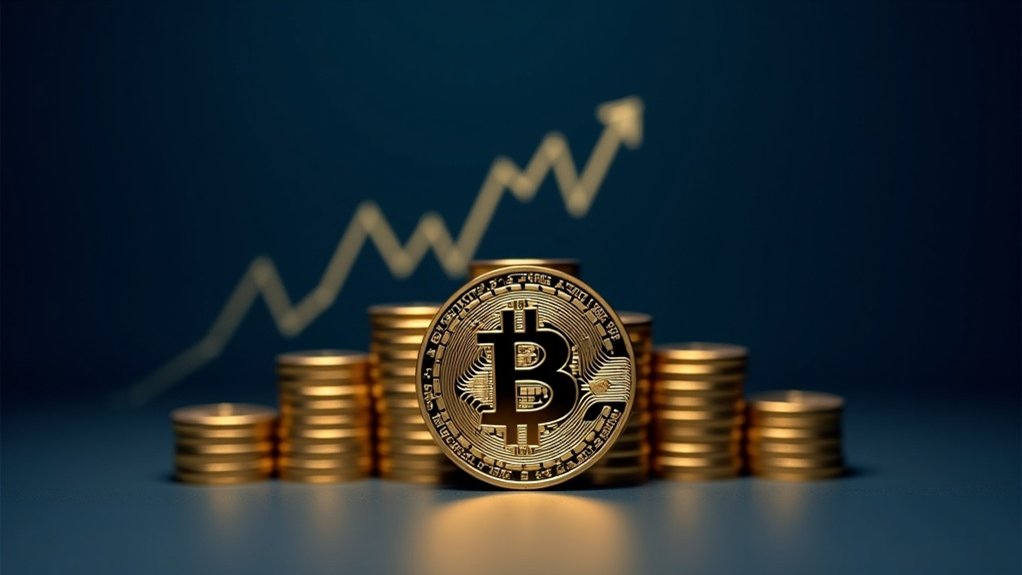100 Bitcoins are currently worth approximately $11.8 million, with each Bitcoin valued around $118,838. The price fluctuates constantly, dancing like electrons from minute to minute. Just a decade ago, these same coins would’ve cost only $100 total. Bitcoin’s value has skyrocketed 74% in the past year alone, 305% over two years. Selling such a fortune isn’t simple—taxes, fees, and market timing complicate the windfall further.
A cool $11.8 million. That’s what 100 Bitcoins will get you today, give or take a few hundred thousand dollars depending on when you’re checking.
The price shifts constantly. One minute it’s $118,838 per Bitcoin, the next it’s something else entirely. Volatile doesn’t begin to describe it. The daily price declines ranged from 0.22% to 0.50% on August 9, 2025.
Real-time converters tell the story minute by minute. Pull up Kraken’s calculator and watch the numbers dance. $11,832,100. No, wait. It changed again. Time stamps matter in this game. A lot.
The price dances like electrons—$11.8 million one moment, something else entirely the next. Bitcoin doesn’t believe in standing still.
The perspective is wild. One hundred Bitcoins is just a tiny drop in Bitcoin’s massive market cap, but it’s still life-changing money for almost anyone.
Try buying 100 BTC back in 2011 when each coin cost about a dollar. That $100 investment would now be worth millions. Talk about a return.
Price appreciation has been bonkers. Up 74% in the last year. A staggering 305% over two years.
Do the math—those gains scale directly when you’re holding 100 coins. What else gives returns like that? Not much.
With this kind of money, you’re in high-end real estate territory. Luxury cars. Maybe a small yacht. Depends where you live and what you’re into.
Not that converting it to cash is completely straightforward.
Selling 100 BTC isn’t like unloading a few shares of Apple. Major exchanges can handle it without crashing the market, but you’ll want to be strategic.
OTC desks exist for exactly this reason. They’ll help move large amounts without everyone seeing your business.
Don’t forget the fees. They add up.
And taxes? The government wants its cut of those gains. Always does.
Settlement timing can be a pain too—could take days to see the actual cash, depending on your bank and jurisdiction.
Currency matters as well. Want euros instead of dollars? Yen? Pounds?
That’s another conversion to factor in. Just another layer in the constantly shifting value of digital gold. With Bitcoin’s value reaching $114,128.35 USD on August 6, 2025, having 100 coins would equate to over 11.4 million dollars.
Frequently Asked Questions
How Do I Safely Store 100 Bitcoins?
For 100 bitcoins (serious money), security isn’t optional.
Hardware wallets like Ledger or Trezor are the gold standard.
Keep them offline. Period.
Smart owners use multisignature setups requiring multiple approvals for transactions.
Cold storage techniques work too—air-gapped computers or metal seed storage devices.
Never, ever store them on exchanges.
Split backup seed phrases between secure locations.
Physical security matters: safes, safety deposit boxes.
Digital millions deserve physical protection.
Can I Buy Fractions of Bitcoin Instead of 100?
Yes, anyone can buy fractions of Bitcoin.
No need to commit to 100 whole coins.
Bitcoin divides to eight decimal places—the smallest unit being a “Satoshi” (0.00000001 BTC).
Most exchanges let users purchase tiny amounts, sometimes starting at just a few dollars.
Perfect for beginners.
Buy 0.001 BTC. Buy 0.5 BTC. Whatever fits the budget.
Same investment potential, just scaled down.
The crypto world doesn’t discriminate against small players.
Fractional ownership is the norm, not the exception.
What Taxes Apply When Selling 100 Bitcoins?
Selling 100 bitcoins triggers capital gains taxes in most countries.
In the US, profits get hit with either short-term rates (ordinary income) if held under a year, or preferential long-term rates if held longer.
UK sellers face Capital Gains Tax above the Annual Exempt Amount.
Canadians? Either capital gains (50% inclusion) or business income.
Many EU countries have similar capital income treatment.
Some Gulf states charge nothing.
Yeah, the tax man always finds crypto profits. Always.
How Long Does Transferring 100 Bitcoins Between Wallets Take?
Transferring 100 bitcoins takes the same time as transferring 0.001 BTC.
Amount doesn’t matter.
Physics of Bitcoin, folks.
Typical confirmation time?
About 10 minutes for first block.
Most services want 3-6 confirmations for finality, so roughly 30-60 minutes under normal conditions.
But reality’s messier.
High network congestion can stretch this to hours.
Higher fees get priority treatment from miners.
Simple as that.
Pay more, wait less.
Are There Alternatives to Bitcoin With Lower Entry Costs?
Yes, numerous lower-cost alternatives exist. Ethereum trades around $1,500-$2,000, much cheaper than Bitcoin. Litecoin stays under $100 per coin. Cardano and Ripple are even more affordable, typically below $1. Polkadot offers blockchain connectivity for under $10.
These altcoins let investors enter crypto with minimal capital.
Each has unique features – faster transactions, smart contracts, or interoperability.
Sure, they’re riskier than Bitcoin. Less liquidity, fewer merchants accepting them.
But hey, not everyone’s sitting on a Bitcoin-sized pile of cash.









